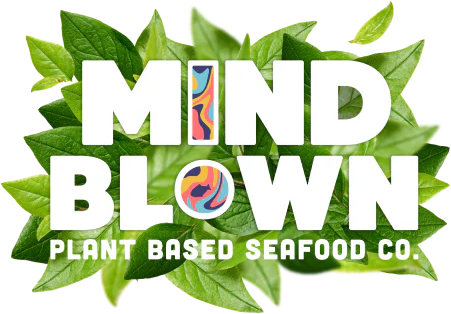
Designed to disrupt the multibillion-dollar seafood industry and help protect our planet's oceans, plant-based seafood alternatives are making major waves.
When the Good Food Institute unveiled its top eight alternative protein trends for 2021, one entry nodded to modern manufacturers increasingly looking "beyond the burger"—and, thankfully, seafood alternatives comprise one category that's enjoying major growth. This shift is long overdue, as the World Wildlife Fund (WWF) reports that "fish ranks as one of the most highly traded food commodities," fueling a $362 billion industry worldwide.
Until recently, relatively few manufacturers dipped a toe into the waters of plant-based seafood alternatives, but times are a-changing. "Our co-founder, Eugene Wang, started this company about 10 years ago, before there was even a hint of a market for vegan seafood," recounts Dr. Miles Woodruff, president and CEO of Sophie’s Kitchen in Sebastopol, California. "Seafood is a staple food item for many cultures, yet a majority of the attention in the plant-based space has been placed on terrestrial animals. This left a gap, but the vegan seafood space
has really gotten traction over the last year."
Turning the Tides
Volumes can—and have—been written about the damaging effects of overfishing and the seafood industry as a whole. But the effects on our oceans don't simply remain at sea; they also affect all life on land (including humans) and our earth's entire ecosystem. Furthermore, Woodruff emphasizes that both wild-caught and farm-raised seafood raise serious ethical and environmental concerns.
Meanwhile, seafood generates an ever-expanding global demand—as the world's population grows, seas are stretched to the limit. "A 2018 United Nations report on the state of world fisheries and aquaculture found that more than 3 billion people rely on seafood as a significant source of protein," notes Dan Skinner, brand communications manager for Chicago-based Gardein. "Overfishing and sustainability are obviously critical concerns, so turning to plant-based alternatives is a way to enjoy the experience of a favorite meal without taxing the fish supply for future generations."
Though only a handful of companies have traditionally tackled the tricky task of creating authentic-tasting vegan seafoods, more manufacturers—backed by millions from major investors (including meat manufacturing giants like Tyson Foods)—have recently emerged to make this a fast-growing category. And today's eco-conscious consumers are increasingly hungry for these options.
Meeting Modern Demands
As the minds behind Good Catch, based in Austin, Texas, witnessed meteoric growth in the plant-based protein category, they also noted the relatively few numbers of plant-based seafood options—so they decided to create some. “When you look at plant-based proteins in general, the options that have become available in recent years have grown immensely,” says chef Chad Sarno, co-founder and chief culinary officer of Good Catch. "That said, there still weren’t a lot of plant-based seafood options on the market.” Since the company’s launch, Sarno notes that the demand for a variety of plant-based options, especially in the seafood category, has grown exponentially.
Shelly Van Cleve, head of product development for The Plant Based Seafood Co. in Gwynn, Virginia, agrees that consumers now demand more choices, but they must offer up great taste for more sophisticated modern palates. "Consumers know the waters are overfished and polluted; the education about our choices and how they can affect and impact people, our planet, and the future of both, has been the catalyst for change," Van Cleve explains. "But commercial success of plant-based seafood can only be achieved by the exact replication of taste, appearance and performance. The seafood lover switching to plant-based does not want to sacrifice anything at all; they want the whole seafood experience, without using the animal."
Skinner agrees that the plant-based category has seen tremendous growth in recent years and is expanding beyond beef alternatives—but, along with a demand for variety, consumer expectations around taste have also grown. "Consumers want plant-based foods that look, cook, smell and satisfy just like meat or fish," Skinner says. "We believe that consumers seeking out plant-based products shouldn’t have to make sacrifices."
Tasting Notes
As with any plant-based replacement for an animal product, nailing attributes like taste and texture are keys to victory within the vegan seafood space—and, experts say, this is no easy task. "At Good Catch, getting the texture correct was one of the biggest challenges for our initial product line, since cooked fish, especially tuna, has a distinct thin layering of protein,” Sarno says. “We spent close to two years working on the textural experience before we started ticking the boxes of taste, versatility and nutrition."
Today's consumers, after all, also want clean labels, with a short list of easily recognizable ingredients—another common concern among plant-based alternatives manufacturers. "The challenge is getting the right look, taste, texture and smell while maintaining clean ingredients that are free from soy and gluten, and non-GMO," Woodruff explains. "Over the last decade, our co-founder put a lot of time, attention and money into the vegan seafood market."
Van Cleve admits that, when creating vegan seafood alternatives, landing on the right taste presents challenges, but texture challenges prove “100 times more difficult.” Then there’s replicating the taste of the ocean, for which The Plant Based Seafood Co. uses a combination of ingredients. “Some I can’t reveal due to the highly competitive climate right now, but some of the ingredients we work with are various kinds of seaweed, algae and kelp, herb extracts, fungi powders and tuber roots,” Van Cleve explains. “The plant-based seafood products we create
have very clean labels, are made for health and well-being, and are sustainable and delicious.”
In The Plant Based Seafood Co.’s InnovEAT Kitchn at its headquarters in Gwynn, team members develop new flavors and products, test cooking methods, and solicit feedback from people who live on the island. “Duplicating the exact texture of an animal is a craft few people have achieved—when you pull apart a scallop and your eye can't tell the difference, that's mind blowing!" Van Cleve says. "Combine that with taste and performance, and you have a mic-drop moment. If it were easy, everyone would be doing it."
Possibilities and Potential
Even with the long-overdue boom in vegan seafood alternatives, there is an incredible amount of potential future growth for companies willing to innovate. The bottom line, according to Sarno: It's abundantly clear that we need a new approach to seafood. "We consume around 250 to 300 species from the ocean globally, which tells us there is endless work to do on innovation opportunities," he says. “From an environmental standpoint, tuna fisheries are some of the most harmful to our oceans and to the environment. The process and nets alone have serious consequences to our oceans—and to far more species than what is being fished for."
Van Cleve points to our ongoing plant-based revolution as a generator for solutions, changing everything about how we think about food. "This will become even more important as the world population grows to 10 billion by 2050, creating further food challenges and increasing demands on our oceans," she explains. "Plant-based seafood will be accessible to everyone now, regardless of whether their choice is because of animal welfare, environmental impact, religious reasons, or because they have allergies or other health problems or are trying to introduce more plant-based versions of their favorite foods (as with flexitarians)."
Skinner adds that as more consumers, especially flexitarians, become interested in the plant-based category, the need for variety has also increased. For example, Gardein is exploring more choices in "flavors and formats alike—both meals that are ready to heat and enjoy, and foods that can be an ingredient in a homemade dish," Skinner says. "We’ll continue to evaluate what fishless offerings make the most sense, in terms of formats (ingredients vs. appetizers vs. entrees) and types of seafood."
For Van Cleve and her staff, the future is plant-based seafood. "When I look around and I see people I never would have guessed—my neighbors and friends, the guy who delivers my packages, my real estate agent, my doctor, my babysitter and the cashier at the grocery store—all telling me they are plant-based or flexitarian, I know this is a new way of living," she says. "It's a more mindful way of living, a new-normal way of living. It's now mainstream and not fringe. I feel the space will continue to grow, offerings will continue to be innovative, and the one-for-one swap-out of every seafood we now eat from the water will be created. Seafood without sacrifice is already here. This is a new frontier, and we haven't even begun to scratch the surface."
Seafood Pizza Inspo
Chef Chad Sarno, co-founder and chief culinary officer of Good Catch, notes that tuna on pizza has not been as popular in the U.S. as it has been in Europe, but it remains a top seller across the pond, in countries like Germany. Why not bring the trend Stateside? Or try one of these ideas from Sarno, who shares some inspiration starters for your next plant-based seafood pie:
Spicy Crab Pizza: Chop crab cakes after cooking and pair them with a spicy red sauce, roasted peppers, sliced jalapeño and vegan Parmesan.
White Clam Pizza: Chop up plant-based tuna and saute with garlicky white wine-butter sauce. Combine with parsley, chili flakes, and vegan mozzarella and ricotta cheeses.
Tuna Carbonara Pizza: Pair plant-based tuna with a vegan béchamel, plant-based bacon and Parmesan.
Meet the Innovators
Today’s innovative manufacturers are making amazing strides in plant-based seafood alternatives. Here are some to keep on your radar, along with the products they offer (and are developing) in this growing category:
Gardein currently offers two frozen fishless products: Golden Fishless Filets, packaged in a 10-ounce bag, and Mini Crabless Cakes, in an 8.8-ounce bag. Both are certified vegan, kosher and dairy-free, with no cholesterol and less than 200 calories per serving. The products make a great appetizer or entrée—Golden Fishless Filets can feature on their own or as part of a sandwich, while Mini Crabless Cakes are great for sharing.
Good Catch was created to offer the same texture, flavor and nutritional value as conventional seafood, without the environmental impact. Its current portfolio includes plant-based Tuna, available in three flavors: Naked in Water, Mediterranean, and Oil & Herbs. Its foodservice Tuna was recently launched in the U.S., while a frozen lineup, with New England Style Plant-Based Crab Cakes, Thai Style Plant-Based Fish Cakes and Classic Style Plant-Based Fish Burgers, is also available in bulk for foodservice. Good Catch products are crafted from the company’s proprietary six-legume blend (peas, chickpeas, lentils, soy, fava beans and navy beans), which is high in protein and creates a texture that mimics the flakiness of seafood.
The Plant Based Seafood Co. Coconut Shrimp has won two national awards: Most Innovative Product of 2020 by Prepared Foods Spirit of Innovation Awards and PETA’s Libby Award for Favorite New Vegan Meat. The company's other products are Dusted Scallops, Dusted Jumbo Shrimp and Lobster Crab Cakes. Its team is currently working on developing Calamari Rings and is adding new flavors to its current products for new additions such as Smokey Bacon Maple Scallops.
Sophie’s Kitchen offers plant-based seafood that is soy-free, gluten-free, and non-GMO. Sophie’s Kitchen products are 100% plant-based, low in calories, and high in protein and fiber. The company’s plant-based seafood includes frozen, refrigerated and pantry-stable products such as Plant-Based Toona (in Black Pepper and Sea Salt varieties), Breaded Vegan Shrimp, Vegan Crab Cakes, Vegan Fish Fillets and Vegan Smoked Salmon.
